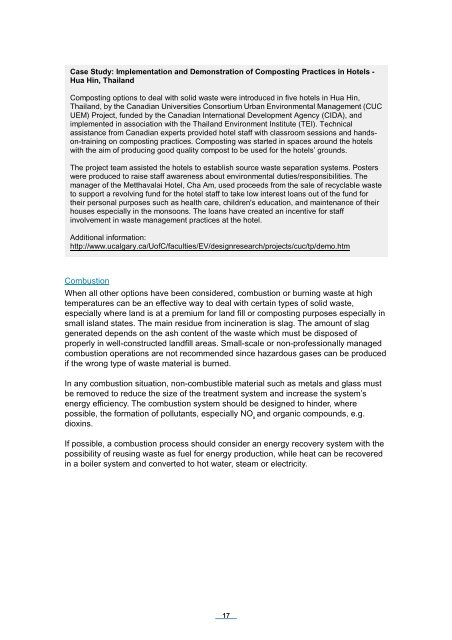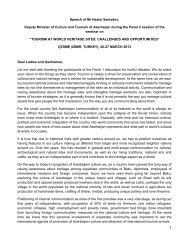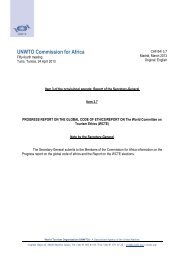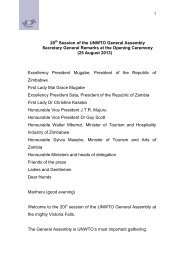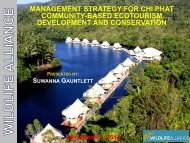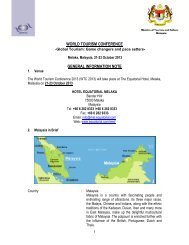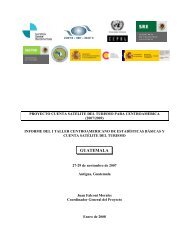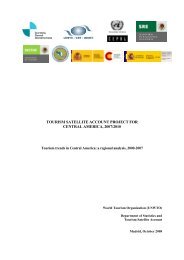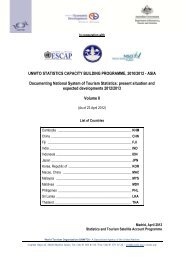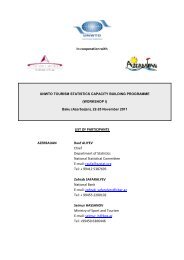A Manual for Water and Waste Management - World Tourism ...
A Manual for Water and Waste Management - World Tourism ...
A Manual for Water and Waste Management - World Tourism ...
You also want an ePaper? Increase the reach of your titles
YUMPU automatically turns print PDFs into web optimized ePapers that Google loves.
Case Study: Implementation <strong>and</strong> Demonstration of Composting Practices in Hotels -<br />
Hua Hin, Thail<strong>and</strong><br />
Composting options to deal with solid waste were introduced in five hotels in Hua Hin,<br />
Thail<strong>and</strong>, by the Canadian Universities Consortium Urban Environmental <strong>Management</strong> (CUC<br />
UEM) Project, funded by the Canadian International Development Agency (CIDA), <strong>and</strong><br />
implemented in association with the Thail<strong>and</strong> Environment Institute (TEI). Technical<br />
assistance from Canadian experts provided hotel staff with classroom sessions <strong>and</strong> h<strong>and</strong>son-training<br />
on composting practices. Composting was started in spaces around the hotels<br />
with the aim of producing good quality compost to be used <strong>for</strong> the hotels’ grounds.<br />
The project team assisted the hotels to establish source waste separation systems. Posters<br />
were produced to raise staff awareness about environmental duties/responsibilities. The<br />
manager of the Metthavalai Hotel, Cha Am, used proceeds from the sale of recyclable waste<br />
to support a revolving fund <strong>for</strong> the hotel staff to take low interest loans out of the fund <strong>for</strong><br />
their personal purposes such as health care, children's education, <strong>and</strong> maintenance of their<br />
houses especially in the monsoons. The loans have created an incentive <strong>for</strong> staff<br />
involvement in waste management practices at the hotel.<br />
Additional in<strong>for</strong>mation:<br />
http://www.ucalgary.ca/UofC/faculties/EV/designresearch/projects/cuc/tp/demo.htm<br />
Combustion<br />
When all other options have been considered, combustion or burning waste at high<br />
temperatures can be an effective way to deal with certain types of solid waste,<br />
especially where l<strong>and</strong> is at a premium <strong>for</strong> l<strong>and</strong> fill or composting purposes especially in<br />
small isl<strong>and</strong> states. The main residue from incineration is slag. The amount of slag<br />
generated depends on the ash content of the waste which must be disposed of<br />
properly in well-constructed l<strong>and</strong>fill areas. Small-scale or non-professionally managed<br />
combustion operations are not recommended since hazardous gases can be produced<br />
if the wrong type of waste material is burned.<br />
In any combustion situation, non-combustible material such as metals <strong>and</strong> glass must<br />
be removed to reduce the size of the treatment system <strong>and</strong> increase the system’s<br />
energy efficiency. The combustion system should be designed to hinder, where<br />
possible, the <strong>for</strong>mation of pollutants, especially NO x <strong>and</strong> organic compounds, e.g.<br />
dioxins.<br />
If possible, a combustion process should consider an energy recovery system with the<br />
possibility of reusing waste as fuel <strong>for</strong> energy production, while heat can be recovered<br />
in a boiler system <strong>and</strong> converted to hot water, steam or electricity.<br />
17


